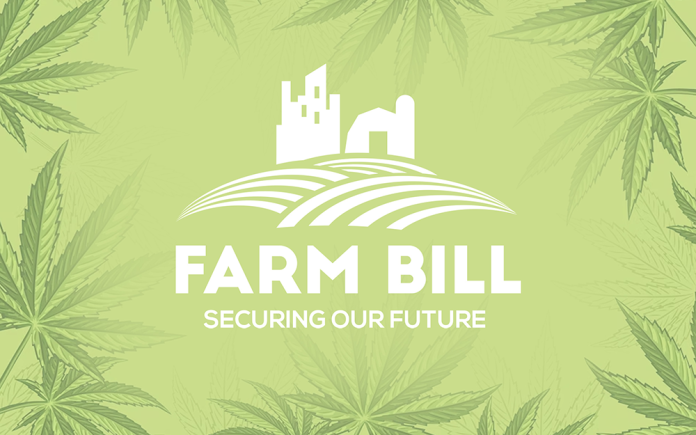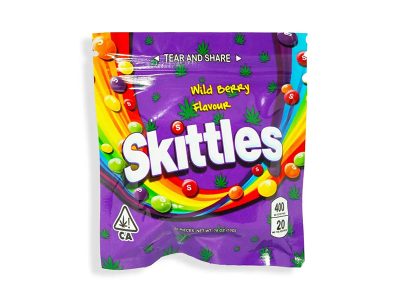
By Ruth Hill R.N.
Today’s hemp market has moved way beyond CBD. The loopholes in the 2018 Farm Bill signed into law by President Trump, have led to the unregulated proliferation of high-dose THC consumables and novel synthetic intoxicants. The Farm Bill allowed hemp products to be labeled safe wellness supplements removing them from regulation by the Food and Drug Administration (FDA). Thus, the commercial market shifted away from non-intoxicating CBD to highly intoxicating pseudo-hemp products that are more intoxicating than state-regulated marijuana. Congress never intended to open the floodgates for these intoxicating, synthetic products.
One example of the most recent synthetic cannabinoids to come to market is “delta-9P,” which is 35 times more potent than the natural THC found in cannabis. THC Skittles Edibles pictured above can be sold to minors as (20) pieces/bag or 400mg of DELTA-8 THC/Skittles package, and 20mg THC/piece. A normal starting dose of THC is 2.5mg-5mg. This 20mg piece of THC is dangerously intoxicating. It also besmirches the highly regulated legal medical cannabis industry.
According to Project CBD, the major loopholes in the 2018 Farm Bill are around the definition of hemp. The Farm Bill defines “hemp” as “the plant Cannabis sativa L. and any part of that plant, including the seeds thereof and all derivatives, (author emphasis), extracts, cannabinoids, isomers, acids, salts, and salts of isomers, whether growing or not, with a delta-9 tetrahydrocannabinol concentration of not more than 0.3 percent on a dry weight basis.” Therein lies the problem. Dry weight vs. allowable THC (0.3%)
Hemp Terms Misinterpreted
“All derivatives” encompasses any compound that can theoretically be chemically synthesized from CBD, even novel compounds not found in the plant in commercially meaningful quantities. The term “whether growing or not” misconstrues the 0.3 percent THC limit applied to the plant biomass and the final product. This results in THC levels labeled as “hemp” exceeding the THC limits set in state-regulated cannabis markets. The omission of THCA in the definition, a natural compound that converts to THC when heated, causes further confusion.
Non-Intoxicating Naturally Derived Cannabinoid Products
This category includes non-intoxicating natural cannabinoids that can be extracted from hemp (or cannabis), such as CBD, CBDA, and CBG. These compounds should be authorized as food additives consistent with state law and regulated appropriately under federal and state authorities based on the product’s end use, i.e., topicals, ingestibles and inhalables.
Intoxicating Naturally Derived Cannabinoid Products
This category includes traditional delta-9 THC and other naturally occurring and intoxicating cannabinoids. These compounds (including delta-8) are molecularly similar to THC. As such, they should be treated in a manner that aligns with state-regulated cannabis products. All intoxicating cannabinoid products – whether derived from cannabis or hemp (which are the same plant) – should fall under the jurisdiction of state cannabis programs and be subject to the same sales and marketing restrictions and safety standards.
Synthetic Designer Drugs
This category includes cannabinoids that are chemically synthesized from hemp or other materials. As these compounds are new and distinct from natural plant cannabinoids, they should be subject to FDA oversight and undergo toxicology studies. This category includes THCO, THCB, THCP, delta9P, THCX, THCH, THCjd, HHCO, HHCP, HXCP, and numerous other new compounds being brought to market at an alarming rate.
 Synthetic cannabinoids have been linked to seizures, acute respiratory failure, heart attack, stroke, lung injury, kidney damage, psychosis, and even death. Most of the new compounds being sold as hemp simply cannot be synthesized from CBD.
Synthetic cannabinoids have been linked to seizures, acute respiratory failure, heart attack, stroke, lung injury, kidney damage, psychosis, and even death. Most of the new compounds being sold as hemp simply cannot be synthesized from CBD.
There is a push to fix the Farm Bill when it comes up for renewal next year. Will Congress fix the loopholes or throw the bill out with the bathwater? Hopefully, both the Republicans and Democrats will simply amend the definition of hemp to:
- Include THC-equivalent compounds within the THC threshold.
- Clarify that the THC percentage threshold applies strictly to hemp biomass, not finished goods.
- Explicitly exclude novel synthetic compounds from the hemp definition and subject them to FDA oversight.
Learn Cannabis Education, Dosing Without the High on the 1st Saturday of the Month from 11 AM to 1 PM at the Vault Dispensary Lounge. Register Here. We are dark in September. send comments to cannaangel16@gmail.com.










































